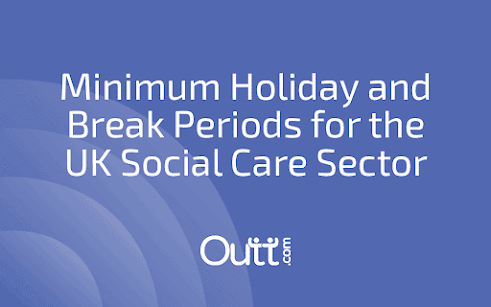MINIMUM HOLIDAY AND BREAK PERIODS FOR THE UK SOCIAL CARE SECTOR
Nobody
wants to be that person who’s brand new to a team and starts niggling about
breaks and downtime – however, all care professionals must make sure they’re
getting the right amount of rest.
Care
work can be very physical and emotionally challenging, so you need to take
advantage of tea breaks, lunch and holidays to ensure you have the resilience
and health to deliver fantastic care.
OUTT.com
regularly hears from candidates who are shocked (in a good way!) to receive
full PAYE benefits with flexible shifts, excellent pay rates, and proper
support. That highlights that it’s well worth taking the time to recap the
legal minimums.
If
you’re ever worried that you aren’t getting the proper holiday entitlement or
days off to recharge those batteries when you’re running on empty, check out
the OUTT.com social care jobs recruitment platform for a
better way to work.
In
the meantime, let’s work through the bare minimum you can expect from a social
care employer.
MINIMUM REST BREAKS FOR CARE WORKERS
Now,
every organisation will have a different policy about rest breaks. Some might
play it by ear and recommend taking a load off in between shifts when things
are quiet.
Others
put in place structured rests, usually in care facilities where it’s impossible
to anticipate a slower part of the day.
Staggered
rest breaks can be a great way to make sure everybody gets a break without
having a mass exodus to the tea room all at once.
UK
legislation states that:
·
Workers are
entitled to one 20-minute rest break without interruption during a typical day
of over six hours.
·
Your breaks can
be taken as lunch or can be a quick tea break.
·
Rest periods
don’t have to be paid for – although great health and
social care jobs in london
employers will grant you at least a 20-minute recharge without docking the time
from your pay slip.
Many
employers will expand on that, offering smaller breaks during the day and a
more extended lunch break.
A
lot depends on the nature of the care organisation you work for – it can be
pretty tricky getting an hour away for lunch if you’re a home care worker,
providing one-on-one support, for example.
BREAK PERIODS DURING NIGHT SHIFT WORK
We
hear you; a typical eight-hour office day isn’t remotely comparable to health
and social care agencies
shifts! If you’re working nights or a longer 12-hour shift, you still have the
right to a proper break.
There
are three types of a break for adult social care workers:
·
First, rest
breaks you take at work.
·
Then daily rest –
i.e. in between shifts.
·
Finally, weekly
rest, which is the amount of time off you need during the working week.
If
you work somewhere that is staffed 24-hours a day, you are entitled to 11 hours
of consecutive rest.
Of
course, if you’re working overnight in a care home on a 12.5-hour shift, that’s
cutting it fine, but it still means you get at least 11 hours away from work.
Say
you can’t have 11 hours away, then you are entitled to compensatory rest breaks
– as long as it all works out within the legal limits over an average week. You
should be getting at least 90 hours off work during any seven days.
We’ve
established that a minimum 20-minute rest is required for any work over six
hours, and that same rule applies no matter what time of day (or night!) you
happen to be on duty.
You’re
also required to have at least one day off per week.
LEGAL UK HOLIDAY ENTITLEMENTS
Next
up, let’s think about holidays. Whether that’s languishing on a tropical beach
with a fruity cocktail or finally getting around to that garden makeover
project, every care worker must get some proper time off every year.
Missing
holidays can cause no end of challenges, and it’s in an employer’s best
interests to ensure their staff are supported, rested, and valued.
Working
flat out without ever taking a break can cause:
·
Fatigue, illness,
mental health conditions, and burn out.
·
Loss of job satisfaction,
commitment and drive.
·
Decreases in
quality of care, professionalism and standards.
·
Resentment, with
exhausted staff feeling demotivated.
There
are national standards in place, applicable to all roles in any employment
sector. For example, UK workers should receive at least 28 days (5.6 weeks) of
paid leave every year.
That
is the statutory entitlement, and anything beneath that for a full-time worker
is a breach of employment law.
Employers
can choose to include public holidays – although having every bank holiday off
is probably a pipe dream in many care roles where patients and residents need
support regardless of the date on the calendar!
LEAVE PERIODS FOR PART-TIME CARE
WORKERS
If
you work part-time, don’t worry; you still have a legal right to a minimum
amount of holiday every year. Legally, anything under five days per week is
considered part-time, although if your shift patterns chop and change, it tends
to work on averages.
You
still get the 5.6-week entitlement, although your number of working days
included in 5.6 weeks will be lower.
Employers
usually adopt a straightforward pro-rata system – so they’ll offer you the same
as a full-time worker, reduced by the relevant number of hours.
For
example:
·
Lisa works 40
hours per week, full-time, eight hours per day. She is entitled to 5.6 weeks or
28 days of holiday – and might split that into half days or take off, say, two
weeks at a time.
·
Stefan works 16
hours a week, part-time, also eight hours a day. He still gets that 5.6 weeks
off, but it works out as 89.6 hours or just over 11 days of holiday.
·
As a temporary
care professional, you get this same calculation, but based on each hour you
get paid for. Your holiday pay is accrued and will show on your payslip, you
can request this money to take paid leave or every week, it’s yours to manage
as you need.
Some
employers will offer a holiday entitlement over that statutory limit. Others
will have policies about booking leave a specific period in advance or not
taking more than two weeks of holiday consecutively.
The
point is that, whatever job you do, you must get time away – whether that’s
grabbing a coffee or taking a whole week to reset your energy stores.
We
all work at our best when we feel enthusiastic and positive, and making sure
you’re getting enough holiday, and a decent number of coffee breaks is
essential to your health as well as job performance!
Original source: - https://outt.co.uk/social-care-news/holiday-periods-social-care-sector/




Comments
Post a Comment